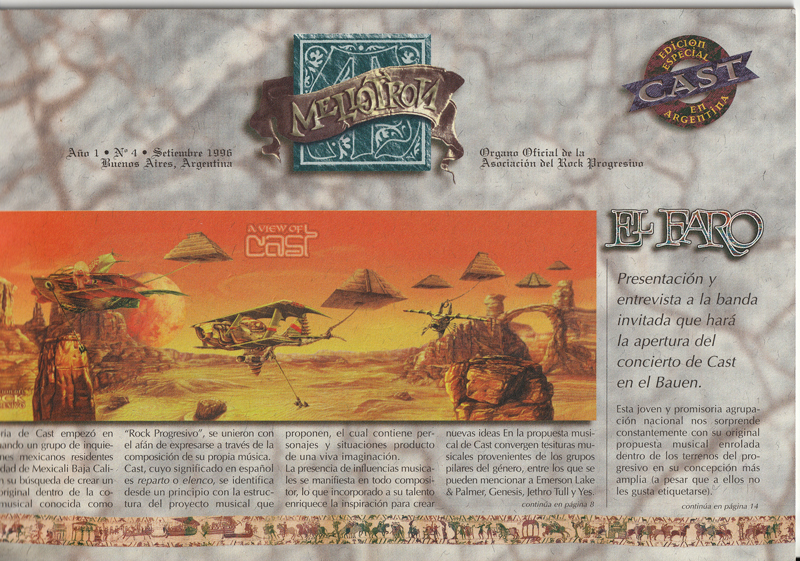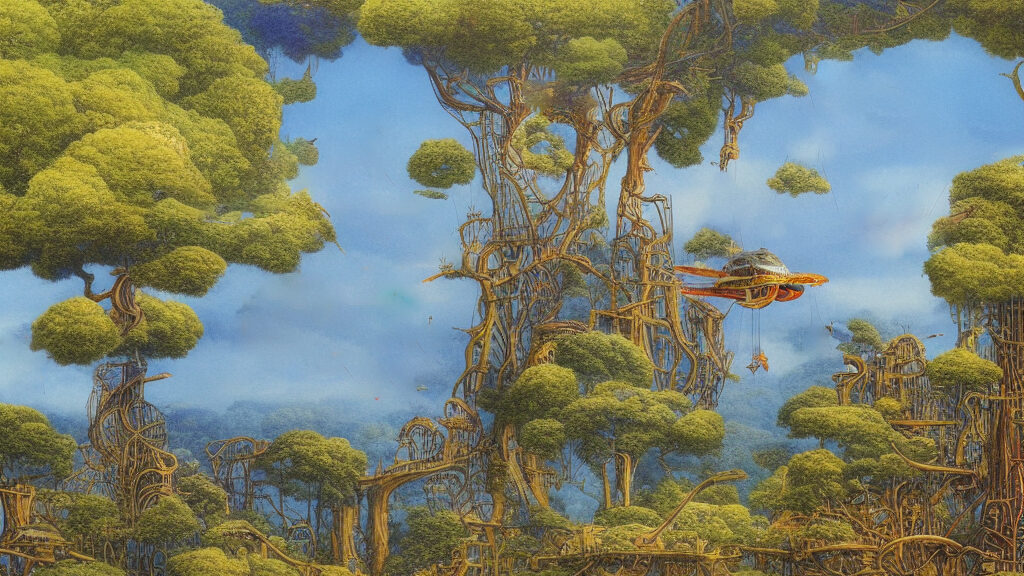
Argentina had one of the first and largest rock scenes in South America during the 1970s. Although Argentine bands were clearly influenced by British progressive rock bands, many musicians developed music that had an Argentine flavor and most of them performed with beautiful poetic lyrics in Spanish. Indeed, progressive rock musicians in Argentina were excellent instrumentalists and superb songwriters in the Spanish language.
One of the first progressive rock albums released in Argentina was Vox Dei‘s double concept album “La Biblia” (Disc Jockey Records, 1971). The band’s original members were Juan Carlos Godoy on guitar and vocals; Ricardo Soulé on guitar and vocals; Rubén Basoalto on drums; and Willy Quiroga on bass and vocals.
Another highly influential band was Sui Generis. They developed a sound that evolved from folk-rock to progressive-leaning rock. The initial lineup include two major names in Argentine rock, Charly García on piano and Nito Mestre on flute, along with drummer Alberto Rodríguez and bassist Alejandro Correa. Discography: “Vida” (Microfón, 1972), “Confesiones de invierno” (Microfón, 1973), “Pequeñas anécdotas sobre las instituciones” (Microfón, 1974) and “Sinfonías para adolescentes” (Microfón, 2000).
The Golden Age of the 1970s
Crucis
Crucis was a leading progressive rock band during the mid-1970s. The group made beautifully-orchestrated progressive rock. It was formed in 1974 by Gustavo Montesano on guitar and vocals; José Luis Fernández on bass; Daniel Frenkel on drums; and Daniel Oil on keyboards. When Fernández left to join La Máquina de Hacer Pájaros, Montesano took up the bass. Guitarist Pino Marrone and keyboardist Anibal Kerpel joined the band. They released two albums, Crucis in 1976 and Los Delirios del Marisccal in 1977.
Espíritu
Another leading symphonic rock band was Espíritu. The original lineup included Osvaldo Favrot on guitar, keyboards and backing vocals; Gustavo Fedel on synthesizers, organ and piano; Fernando Bergé on lead vocals; Claudio Martinez on bass and backing vocals; and Carlos Goler on drums, percussion and backing vocals.
Espíritu released two critically-acclaimed albums, Crisálida (1975) and Libre y Natural (1976). The rest of their studio discography includes Espíritu (1982), En movimiento (1983) and Fronteras Mágicas (2003). Live albums: Live en Obras (1982), Espíritu en vivo (2004) and En Vivo En El Centro Cultural Recoleta (2004).
La Máquina de Hacer Pájaros
La Máquina de Hacer Pájaros, a progressive symphonic rock project led by the iconic Charly García, rolled out a self-titled album in 1976, one of the finest releases of the mid-1970s. The group launched a second and final album, Películas (1977). The lineup included Charly García on keyboards and vocals; Gustavo Bazterrica on guitar; José Luis Fernández on bass; Oscar Moro on drums; and Carlos Cutaia on keyboards.
Arco Iris
Arco Iris combined progressive rock, jazz fusion, African beats and other genres with Latin American rhythms. The original lineup included Gustavo Santaolalla on guitar and vocals; Guillermo Bordarampé on bass; Ara Tokatlian on flute, saxophone, winds, keyboards; Alberto Cascino on drums; and Danais Wynnycka on vocals.
Arco Iris released the following albums: Arco Iris (1970), Tiempo de resurrección (1972), Sudamérica o el regreso a la aurora (1972), Inti-Raymi (1973), Agitor Lucens V (1974), Los Elementales (1977), Faisán azul (1983), Peace Pipes (1988), Peace Will Save the Rainbow (1996), Arco Iris en vivo hoy (2001) and Desde el jardín (2012).
Alas
One of the most original of the 1970s bands was Alas. Led by keyboardist Gustavo Moretto, Alas combined symphonic rock with Argentine tango. It was in essence one of the first tango rock bands. Original line-up: Alex Zucker on bass and guitar; Gustavo Moretto on keyboards, wind instruments and vocals; and Carlos Riganti on drums and percussion. They recorded Buenos Aires sólo es piedra in 1976. Bassist Pedro Aznar replaced Zucker in 1977. Alas disbanded in 1978. A second album, Pinta tu aldea, came out in 1983, a few years after the band broke up.
Luis Alberto Spinetta
The late guitarist and talented songwriter Luis Alberto Spinetta‘s band Spinetta evolved from blues rock to progressive rock and later to jazz-rock fusion under the band name Spinetta Jade. “Durazno Sangrando” and “A 18´ del Sol” were two of his finest albums.
Bubu
Bubu released one excellent King Crimson-inspired album titled “Anabelas” (1978) in the 1970s. A new lineup formed in 2016. They released El Eco Del Sol (2018). The cast included Petty Guelache on lead and backing vocals; Eduardo Rogatti on guitar and effects; Sergio Polizzi on violin; Cecilia Tenconi on flute, piccolo, bass flute; lyricist Wim Forstman on tenor saxophone; Edgardo “Fleke” Folino on bass and effects; Eduardo “Polo” Corbella on drums, percussion; and composer and arranger Daniel Andreoli.
MIA
MIA (Músicos Independientes Asociados) was a remarkable collective of musicians that had an independent do-it-yourself philosophy.
Músicos Independientes Asociados (MIA) was a musician co-op that appeared in 1975. The core group included a trio of musicians, guitarist, and bassist Alberto Muñoz; vocalist and drummer Liliana Vitale; and child prodigy Lito Vitale (who was only 12 years old at the time), who played keyboards and drums. Other key band members included Daniel Curto (guitar), Nono Belvis (bass), and Juan del Barrio (keyboards, drums).
Eventually, the co-op grew to around 60 people. They produced their own concerts and recordings and stayed away from the commercial gig circuit. To support themselves, they also taught music. In essence, they were pioneers of independent rock in Argentina.
MIA played exquisite symphonic progressive rock and released independently produced albums. The discography includes Transparencias (1976), Mágicos juegos del tiempo (1977), Cornostípicum
(1978), Conciertos (1979), and María Elena de nosotros (1981).
Lito Vitale
MIA spawned Lito Vitale as a solo artist. He released a solo album, a progrock masterpiece concept album called Sobre miedos, creencias y supersticiones (1981). Lito later became famous in Argentina and Europe, specially Spain, releasing highly popular instrumental albums ranging from progressive rock to new age and tango-flavored world music.
Invisible
Invisible was one of Luis Alberto Spinetta’s projects. Although the group started as a straight ahead rock band on its debut album, it evolved towards progressive and released two of the best Argentine rock albums on the 1970s, Durazno Sangrando (1975) and El Jardín De Los Presentes (1976). The initial lineup was Luis Alberto Spinetta on electric and acoustic guitars, synthesizer, and vocals; Carlos Rufino “Machi” on bass; and Héctor Lorenzo “Pomo” on drums and percussion. On El Jardín De Los Presentes they added virtuoso guitarist Tomás Gubitsch.
Serú Girán, the Superband
Serú Girán was an Argentine progressive rock and fusion superband created in 1978. It featured some of the finest musicians and songwriters in the Argentine rock music scene: Charly García on keyboards and vocals; David Lebón on guitars and vocals; Oscar Moro on drums and percussion; and Pedro Aznar (one of the finest jazz bassists in the world, who joined the Pat Metheny Band for a few years as bassist and vocalist) on electric and fretless bass, and vocals.
Discography: Serú Girán (Music Hall, 1978), La Grasa de las Capitales (Music Hall, 1979), Bicicleta (SG Discos, 1980), Peperina (SG Discos, 1981), Serú ’92 (Sony Music, 1992).
The Argentine Scene in the 1980s
Pablo El Enterrador
Pablo el enterrador released one of the finest Argentine albums of the 1980s, the self-titled “Pablo el enterrador,” a symphonic progressive rock masterpiece with neoprog influences as well. The original lineup included Jorge Antún on Oberheim OB-X synth, Hammond organ; Marcelo Sali on drums; José Maria Blanc on electric and acoustic guitar, bass, vocals; and Omar López on Yamaha CP-70 electric piano, and ARP pro and Minimoog synthesizers.
In the 1990s, the band returned with Pablo “El Enterrador” 2 (1998), Sentido de Lucha (1998), and Threephonic (2016). José Maria Blanc released a tribute to the band called La Herencia De Pablo in 2018.
Agnus
Although Agnus was formed in 1974 in the province of Santa Fe, the band recorded “Pinturas y Expresiones” in 1980. At that time, Agnus was led by founding member Luis Sáenz (guitar). The band’s sound was characterized by Sáenz excellent guitar work, violin, female backing vocals and flutes.
Altablanca
Altablanca released a rare symphonic progressive rock live album recorded in 1981, En Vivo Mendoza ‘81 (Viajero Inmóvil Records).
Mandragora
The Argentine Progrock Panorama in the 1990s
The Spanish language Discover Magazine appeared in the 1990s featuring in depth articles, interviews of progressive rock artists as well as Celtic music. https://www.mellotronweb.com.ar/discoverstore.htm

Sergio Alvarez
Sergio Alvarez is an Argentine keyboard wizard. He played with a band called In Extremis in the 1980s and 1990s. In 1998, he launched a solo career as a symphonic progressive rock keyboardist, heavily influenced by Rick Wakeman and Keith Emerson. His solo discography includes Pasaje A La Revelación and Naturalezas Disonantes (Epsilon Records).
Supernova
The name of the and was actually Supernova Rock Sinfónico. The group was envisioned by drummer and percussionist Norberto Barcala while studying at a music high school. He recruited Alejandro Kordon (flute and keyboards), Eduardo Penney (guitar), and Mariano Sánchez (bass). They released two albums: Rock Sinfonica: 1. Un Punto Infinito (1998) and Lleva el brillo del Sol (2002)
Tánger
Buenos Aires band Tánger was founded around 1995 by bassist and keyboardist Luis Colucci and flute player Daniel Algieri. The group plays high energy progressive rock with fusion elements. They released several studio albums, including Tanger (1999), La Otra Cara (2002), Ciudad (2006) and Mundos Paralelos (2008).
Amagrama
Amagrama is an Argentine symphonic progressive rock band that was founded in Buenos Aires in 1998. The group was formed by four teenagers, Agustin Amaya (keyboards, synthesizers, lead vocals), Juan Cruz Sanabria (guitars), Juan Amaya (drums, percussion, and vocals), and Javier Martinez (electric bass). They initially played covers of songs by famous bands such as The Beatles, Pink Floyd, and Queen, but later began to write their own compositions.
Amagrama’s music is heavily influenced by Argentine progressive rock legends such as Crucis, El Reloj and Pabloe El Enterrador, as well as newer bands like Nexus and the symphonic rock legends Genesis and King Crimson.
In 2003, Amagrama started recording their debut album, “Ciclotimia,” which was released in 2004. The album features propulsive and lush progressive rock with remarkable solos and interplay.
The Argentine Progressive Acts of the 2000s
Omnia
Omnia was a highly regarded symphonic progressive rock band influenced by Genesis and other classics. Band members included Federico Fernández on drums and percussion; Nicolás Núñez on vocals and percussion; Pablo Sangineto on keyboards; and Alejandro Scarpato on guitars.
The band released two albums, Último Generador de Equilibrio (2000) and Hormonal (2003). The concept album Hormonal is considered one of the finest Argentine progressive rock albums of the 2000s.
Chaneton
Chaneton was founded by guitarist Alex Chaneton, formerly of Argentine progressive rock band Mandrágora. He teamed up with vocalist Patricio Villanueva, a singer reminiscent of Fish (Marillion), and other musicians. The lineup solidified with Carlos Kepple on keyboards, Jano Sarmenti on drums, and Adrián Marques Gomes on bass guitar.
The band’s discography includes their debut album “Questions Inside the Picture,” a neoprog album with English lyrics, drawing influence from Marillion and Genesis. This influence is further emphasized in their tribute album to Genesis, “Cinema Show” (2001).
In 2004, Chaneton released their third album, “First Lights of The Century.”
Madame Claus
Madame Claus is an Argentine band formed in 2001 by Pablo Gómez Salvo (guitar), Marcelo Lancon (bass), Pablo Perego (keyboards), Daniel Fernandez (vocals), and Fausto Manes (drums). Before releasing a studio album, they recorded 3 live CDs: “Vivo en Acatraz I,” “Acatraz II vivo!”, and “Acatraz III”.
In 2005, they released their only studio album “Quemando Oscuridad” (Burning Darkness), featuring dark, introspective songs that blend symphonic, heavy progressive rock, and pop elements. The band broke up in 2007 and changed its name to Verne following personnel changes.
Autumn Moonlight
The delightful Autumn Moonlight was formed in 2009 by Tomás Barrionuevo and Mariano Spadafora, in Berazategui, Buenos Aires, Argentina. Its musical style is primarily a fusion between Post-rock and progressive rock.
Hyacintus
The Argentine Scene in the 2010s
Acantilados
Acantilados is an instrumental post rock band with a progressive edge from Quilmes. Band members: Nicolas Aimone on bass; Pablo Leal on drums; and Lucas Leal on guitar. They released their first album in 2014 and an EP, Lobos/Buhos in 2016.
Agrabah
Agrabah is a psychedelic and progressive rock band hailing from Buenos Aires, Argentina. The lineup includes Francisco Marcos on guitar and vocals; Marko Vrljiĉak on guitar and synthesizers; Joaquin Cross on bass and backing vocals; and Gonzalo Martínez Oríz on drums and backing vocals. Their debut album, “Entering The Flesh Again,” which was released in 2015, presents a unique sound that seamlessly blends progressive and experimental elements with other influences.
Eiemel
Ariel Martin Loza, former bass player of symphonic progrock band Láquesis from Argentina, launched his solo project Eiemel in 2017. With a wealth of unused songs, he teamed up with various musicians, including a wind section, to create introspective music that blends symphonic prog, folk, and neo-prog styles.
The self-titled album is a reflection of his life experiences. Ariel handles lead & backing vocals, bass, keyboards, guitars, programming, percussion, orchestral arrangements, and composition. He is joined by Federico Silva (guitars), Daniel Mistretta (guitars), Rodrigo San Martín (guitars), Yamil Mohadile (trombone/brass arrangements), Bruno Lazzarini (trumpet), Las Gaitas Asesinas San Virulais (bagpipes), Luisina Pérez (flute), Inés Garrocq (flute), Ariel Aguilar (bandoneon), Iván Louro (drums), Damian Luscher (drums), Álvaro Manzanero (drums), and Martin Blengino (drums).
Mariano Hayón
Mariano Hayón, from Buenos Aires, Argentina, is a writer of epic compositions that can be as long as a full album. In 2015, he played in a jazz fusion outfit after recording his first three albums, but continued his solo career.
With the discovery of better quality instruments, Mariano was able to achieve the desired sound in his “Alchemy” that features extended fusion symphonic progressive rock songs, one reaching 50 minutes. The music showcases a blend of Latin and Jazz piano elements with dark symphonic prog keyboard sections.
Mariano’s discography includes: Merging Dynamics (2014), Full Circle (2015), Outside (2015), El Camino (2019) and Alchemy (2020).
Láquesis
Láquesis was founded in 2013 in Rosario, Argentina, a city located in the province of Santa Fe. The band consists of five members: Diego Actis (keyboards), Guillermo Caminer (guitars), Ariel Loza (bass/vocals), Martin Puntonet (vocals), and Martin Teglia (drums). Their self-titled debut album combines elements of symphonic progressive rock, hard rock, and classic Argentine melodic progrock from the 1970s, delivering a delightful listening experience.
